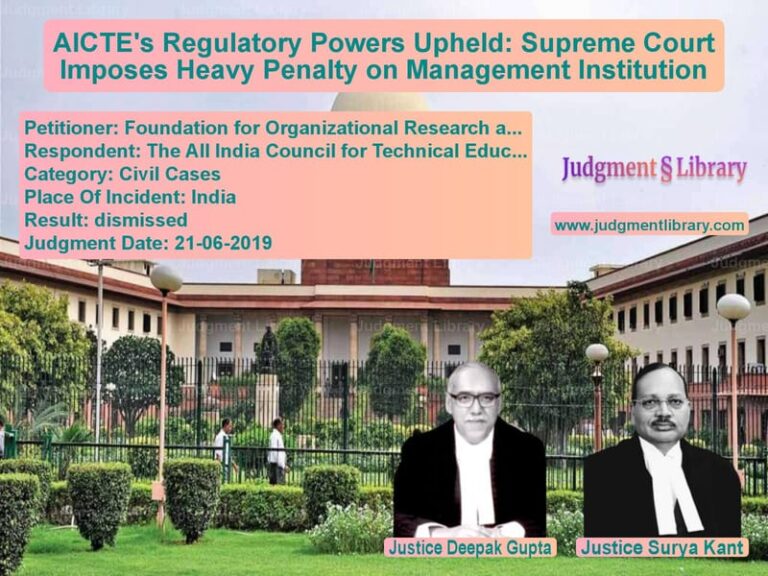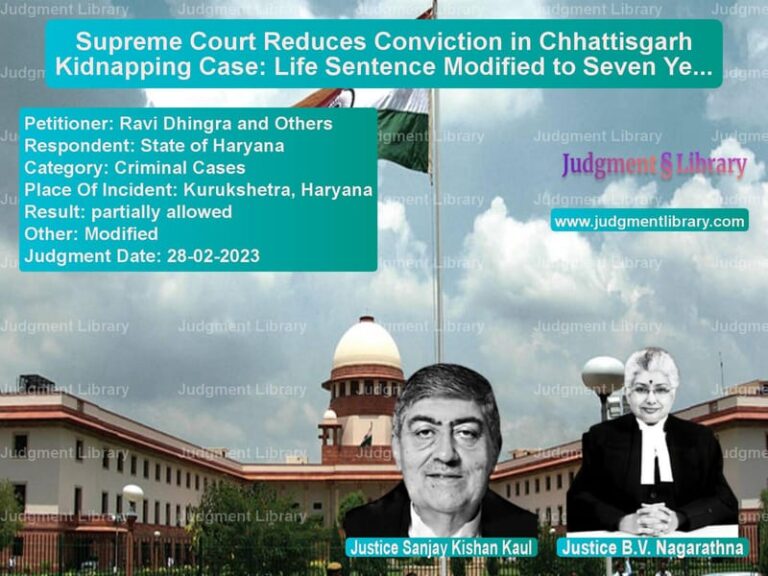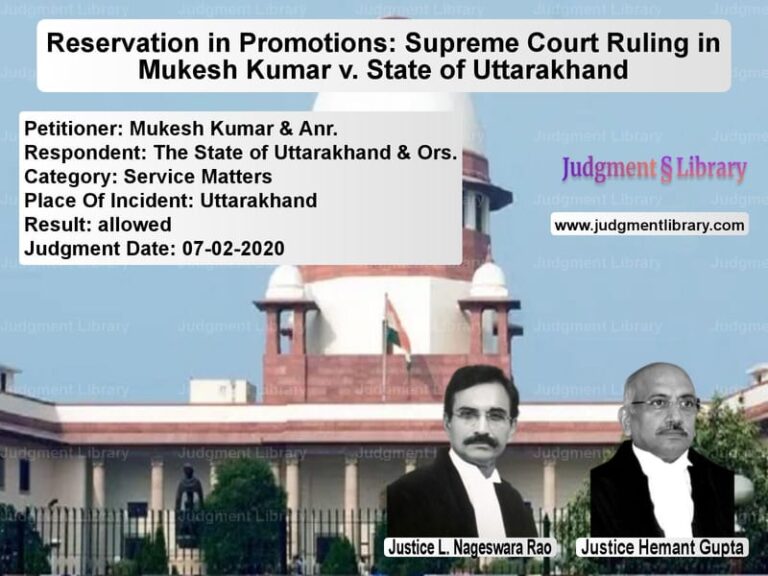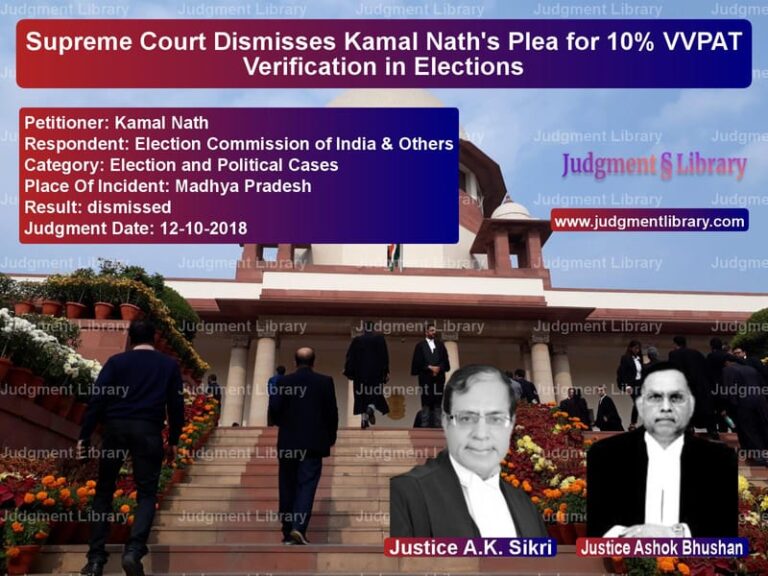Supreme Court Quashes Arbitrators’ Appointment in EMAAR India vs. Tarun Aggarwal Projects Dispute
The Supreme Court of India recently ruled in the case of M/s EMAAR India Ltd. vs. Tarun Aggarwal Projects LLP & Anr., setting aside an order by the Delhi High Court appointing arbitrators in a contractual dispute. The apex court found that the High Court failed to conduct a preliminary inquiry into whether the dispute was arbitrable, as required under the arbitration agreement. The ruling reiterates the principle that courts must scrutinize arbitration clauses carefully before referring disputes to arbitration.
Background of the Case
The case originated from a Collaboration Agreement dated May 7, 2009, between M/s EMAAR India Ltd. and Tarun Aggarwal Projects LLP for the development of a residential colony in Sector 62 and 65, Gurugram. An Addendum Agreement was later executed on April 19, 2011, to modify certain terms.
A dispute arose between the parties, with the respondents claiming that EMAAR had failed to fulfill its obligations under the Addendum Agreement. On November 20, 2019, the respondents issued a legal notice, demanding physical possession of five plots measuring 2,160 square yards and compensation of ₹10 crores for alleged losses.
When EMAAR refused to appoint an arbitrator, the respondents approached the Delhi High Court under Section 11(5) & (6) of the Arbitration and Conciliation Act, 1996, seeking the appointment of arbitrators. The High Court allowed the request and appointed arbitrators, leading to this appeal in the Supreme Court.
Legal Arguments
Arguments by EMAAR India Ltd.
- EMAAR argued that the High Court had ignored Clause 36 of the Addendum Agreement, which stated that disputes regarding certain clauses (Clauses 3, 6, and 9) must be resolved through litigation and not arbitration.
- Clause 37 of the agreement provided for arbitration, but only for disputes not covered under Clause 36.
- The High Court failed to conduct a preliminary inquiry to determine whether the dispute fell within Clause 36 or 37 before appointing arbitrators.
- Relying on the Supreme Court ruling in Uttarakhand Purv Sainik Kalyan Nigam Ltd. vs. Northern Coal Field Ltd., EMAAR argued that courts can refuse arbitration if the dispute clearly falls outside the scope of an arbitration agreement.
Arguments by Tarun Aggarwal Projects LLP
- The respondents contended that Clause 36 did not exclude arbitration but merely allowed a party to seek specific enforcement of the contract through the courts.
- They argued that a conjoint reading of Clauses 36 and 37 showed that arbitration was not barred.
- The Supreme Court decision in Vidya Drolia vs. Durga Trading Corporation was cited, asserting that the arbitrability of disputes should be determined by the arbitrator, not the court.
- The respondents maintained that arbitration should be the preferred dispute resolution mechanism, and the High Court had rightly exercised its jurisdiction under Section 11(6) of the Arbitration Act.
Supreme Court’s Observations
The Supreme Court, led by Justice M.R. Shah and Justice Krishna Murari, examined the case and made the following critical observations:
1. Courts Must Conduct a Preliminary Inquiry
The Court emphasized that under Section 11 of the Arbitration Act, courts must conduct a preliminary inquiry to determine whether a dispute is arbitrable before appointing arbitrators.
2. Clause 36 Excludes Arbitration for Certain Disputes
The Court held that Clause 36 explicitly required disputes related to Clauses 3, 6, and 9 of the Addendum Agreement to be resolved through appropriate courts of law. This meant such disputes were not arbitrable under Clause 37.
Read also: https://judgmentlibrary.com/supreme-court-orders-arbitration-in-sikkim-hotel-lease-dispute/
3. High Court Ignored Key Contractual Provisions
The Supreme Court found that the High Court had failed to examine whether the dispute fell under Clause 36 before appointing arbitrators. The Court ruled that arbitration cannot be forced where it is explicitly excluded by contract.
4. Judicial Precedents Support a Limited Review at the Referral Stage
The Court relied on previous rulings, including:
- Vidya Drolia vs. Durga Trading Corporation (2021) 2 SCC 1: Stating that courts may interfere at the referral stage if it is clear that a dispute is not arbitrable.
- Garware Wall Ropes Ltd. vs. Coastal Marine Constructions & Engineering Ltd. (2019) 9 SCC 209: Holding that the validity of an arbitration agreement must be examined before referring disputes to arbitration.
- Oriental Insurance Co. Ltd. vs. Narbheram Power and Steel (P) Ltd. (2018) 6 SCC 534: Stating that arbitration clauses must be strictly interpreted and cannot be extended beyond their intended scope.
Final Verdict
The Supreme Court ruled in favor of EMAAR India Ltd. and made the following orders:
- The appointment of arbitrators by the Delhi High Court was quashed.
- The matter was remitted to the High Court to conduct a preliminary inquiry and determine whether the dispute was arbitrable under Clause 36.
- The High Court must analyze whether the dispute falls under Clause 36 (non-arbitrable) or Clause 37 (arbitrable) before deciding on arbitration.
Impact of the Judgment
This ruling has significant implications for contract enforcement and arbitration in India:
- It reinforces the principle that courts must carefully interpret arbitration clauses before referring disputes to arbitration.
- Parties cannot be forced into arbitration if their contract clearly requires litigation for specific disputes.
- The judgment serves as a reminder that contractual intent must be honored in dispute resolution.
Conclusion
The Supreme Court’s ruling in EMAAR India Ltd. vs. Tarun Aggarwal Projects LLP reaffirms that courts must scrutinize arbitration agreements before appointing arbitrators. By ensuring that only arbitrable disputes go to arbitration, the judgment strengthens the integrity of contractual obligations and protects parties from being forced into an alternative dispute resolution mechanism that was never agreed upon.
Petitioner Name: M/s EMAAR India Ltd..Respondent Name: Tarun Aggarwal Projects LLP & Anr..Judgment By: Justice M.R. Shah, Justice Krishna Murari.Place Of Incident: Gurugram.Judgment Date: 30-09-2022.
Don’t miss out on the full details! Download the complete judgment in PDF format below and gain valuable insights instantly!
Download Judgment: ms-emaar-india-ltd.-vs-tarun-aggarwal-proje-supreme-court-of-india-judgment-dated-30-09-2022.pdf
Directly Download Judgment: Directly download this Judgment
See all petitions in Arbitration Awards
See all petitions in Dispute Resolution Mechanisms
See all petitions in Enforcement of Awards
See all petitions in Judgment by Mukeshkumar Rasikbhai Shah
See all petitions in Judgment by Krishna Murari
See all petitions in allowed
See all petitions in Remanded
See all petitions in supreme court of India judgments September 2022
See all petitions in 2022 judgments
See all posts in Arbitration and Alternate Dispute Resolution Category
See all allowed petitions in Arbitration and Alternate Dispute Resolution Category
See all Dismissed petitions in Arbitration and Alternate Dispute Resolution Category
See all partially allowed petitions in Arbitration and Alternate Dispute Resolution Category







